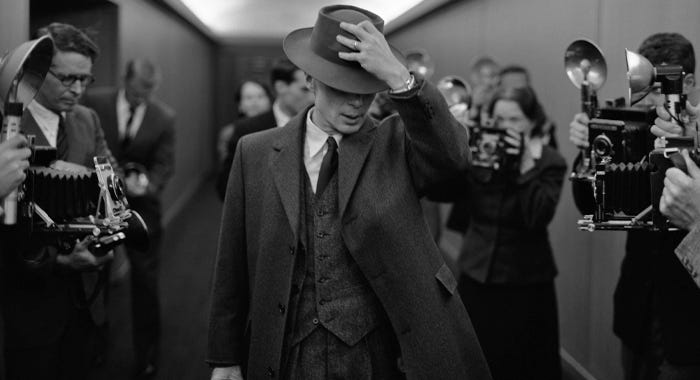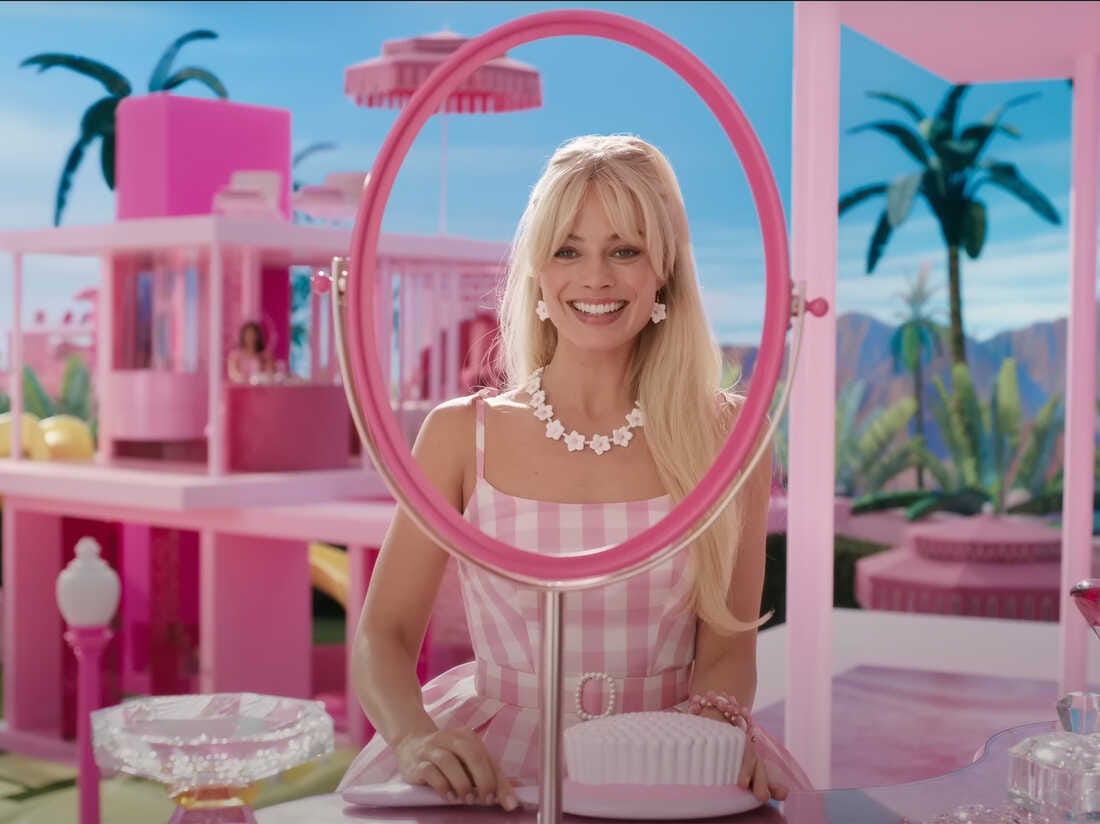In Review: 'Oppenheimer,' 'Barbie'
As expected, the "Barbenheimer" weekend offers the two most compelling movies of the summer.
Oppenheimer
Dir. Christopher Nolan
180 min.
In the stunning eighth episode of Twin Peaks: The Return, the series diverges from its main narrative to offer an extended scene of the first test of the atomic bomb at White Plains, NM in 1945. What follows is a kind of origin story for the Twin Peaks cosmos, culminating with scenes of demonic figures insinuating themselves into a picturesque desert town 11 years after the blast. As with all things Twin Peaks, and Lynch in general, what it all means is open for discussion, but it seems unlikely that tying a depictionn of how evil enters the world to the dawn of the atomic age is mere coincidence. Born a year after the test, Lynch was one of the first of a generation that knew no world except one that could end in flames at the push of a button.
Christopher Nolan’s films have little in common with Lynch’s work but Oppenheimer, Nolan’s biopic of “Father of the Atomic Bomb” J. Robert Oppenheimer, is pervaded with a similar sense of irreversibility, treating the Trinity test as a point of no return, an act once committed would forever change the world, and possibly set it up for destruction. Nolan’s films have long played with time, and Oppenheimer is no exception. But here, the flitting through the most eventful years of Oppenheimer’s life all feed into or empty out of that fixed moment, when the brilliant minds behind an extraordinary scientific project handed humanity a weapon of unthinkable power then lost control of what happened next.
The film unfolds on two timelines, each anchored to a dramatic, and fraught, hearing. In one, shot in color and anchored in 1954, Oppenheimer (Cillian Murphy) sits before a committee that will determine whether he’ll have to surrender his security clearance due to his previous (and already well-known) association with members of the Communist party. The second, shot in black-and-white, is built around the 1958 Senate confirmation hearing of Lewis Strauss (Robert Downey Jr.), the first chairman of the Atomic Energy Commission, Dwight Eisenhower’s nominee for commerce secretary, and a man with whom Oppenheimer had a complex, ultimately adversarial relationship.
Oppenheimer moves at a sometimes dizzying pace, jumping freely through time as it switches between its two narrative tracks. Nolan introduces dozens of characters across incidents that at first seem unrelated. Here’s Oppenheimer as a frustrated student. Here he is considering taking a Princeton job offered by Strauss in the years after World War II. It’s the sort of film that can only benefit from a second viewing; familiarity with Nolan’s primary source, Kai Bird and Martin J. Sherwin’s 2005 book American Prometheus: The Triumph and Tragedy of J. Robert Oppenheimer; or, ideally, both. But as with Dunkirk, it’s also a film that teaches viewers how to watch it. Details cohere into patterns. Dots get connected. Characters first glimpsed in the background come into focus. And, always at the center even when he’s not on screen, is Oppenheimer.
Long a Nolan favorite, Murphy gives Oppenheimer its center of gravity, and its sense of graveness. In the film’s earliest scenes—chronologically if not always in placement—he already looks like a man burdened with an incalculable weight, as if he already understood that the ideas and formulas swimming in his head would have global consequences. Alarmingly thin (Murphy has cited late-’70s David Bowie as a physical model), restrained in expression, and with a low, deliberate manner of speaking that’s reminiscent of Peter Weller’s William S. Burroughs in Naked Lunch, Murphy’s Oppenheimer is an unnerving presence, but also a man of undeniable genius driven by a strong sense of what needs to be done at all times. That drive extends to his unwillingness to draw a line between his educational life and support for leftist causes that put him shoulder to shoulder with Communists, which sets the stage for his later troubles.
The intense focus, and Murphy’s exceptional work, make Oppenheimer work equally well as a study of a remarkably complex character whose greatest accomplishment would become his greatest (but hardly only) source of torment and as the story of that character’s journey through one the most transformative events in human history. Nolan makes Oppenheimer both biography and thriller. The nervy filmmaking and Ludwig Göransson’s intense score combine in an atmosphere of unrelenting dread. That’s, perhaps expectedly, true in scenes of Oppenheimer and an all-star band of mid-century scientific minds (played by, among many others, Michael Angarano, Benny Safdie, Josh Hartnett, Jack Quaid, Rami Malek, and Olivia Thirlby). But it’s employed just as effectively when the film navigates his sometimes-relationships with the women in his life, particularly psychiatrist Jean Tatlock (Florence Pugh) and his wife Kitty (Emily Blunt), a woman whose supportiveness of her husband could never be mistaken for weakness, in part because it seems to be stretched to its limit at every moment.
Every scene feels like a cataclysm waiting to happen, fitting for a film that builds, step-by-step, to the creation of a cataclysm machine. Oppenheimer both summons awe for what it took to build the bomb—including the construction of a whole, isolated community at Los Alamos—and for the changes it wrought. Even before the Trinity test, the film depicts atomic weaponry’s looming introduction as a divisive force, one that some (like Oppenheimer, at least initially) believed could end all wars and that others saw as an invitation for an apocalypse. It’s a story for which Nolan summons the full force of his skill at making movies of massive size—literally for those who see it in IMAX, but figuratively no matter what the format—but also the much smaller story of a man who redirected history then found himself crushed by the world he helped create. —Keith Phipps
Oppenheimer opens tomorrow at theaters everywhere.
Barbie
Dir. Greta Gerwig
114 min.
The rise of IP as a near-prerequisite for risk-averse studios has put directors of ambition in a compromising position: How do you express a personal vision within the constraints of fan (and brand) expectation? That’s a particularly vexing proposition for Greta Gerwig’s Barbie, which has to build a narrative around a doll that’s had such a seismic impact on the culture and the way little girls understand womanhood that the obligatory hat-tips and payoffs are not enough. There are landmines to sidestep, too. Can you advance feminism while boosting a toy corporation? How much can you question the mythos of a doll that’s had a mixed track record, at best, in reinforcing standards of beauty and achievement? And even if you manage to thread this exceedingly thin needle, can you still show the audience a good, bubbly time at the movies?
Gerwig endeavors to try, with the understanding that perfection is unattainable. Her Barbie cannot be all things to all people, and it cannot wriggle away from the contradictions that ensnare it. It's a heroic effort nonetheless, a bright and funny and ever-so-close-to-subversive bauble that’s willing to take chances and assert itself in the largest possible cultural arena. And that squares with its idea of womanhood as an impossible undertaking that requires a certain guile to pull off if you want to dictate the terms. “Strong” women have been a dull, obligatory component of blockbusters for years, second only to gender-reversal in their lack of imagination. Gerwig goes for “complicated,” and makes a satisfying mess of things.
The opening third is The Truman Show with double the artifice, as a Stereotypical Barbie (Margot Robbie), who exists in a utopian Barbieland, lives harmoniously in her Dream House along with a vast product line of other Barbies and Kens, though one Ken, played by Ryan Gosling, is particularly attached to her. Barbie’s perfect days in this matriarchal society—Ken’s role here is simply “Beach”—are disrupted first by minor hiccups, like “flat feet” and a cold fake shower, but thoughts of death and other melancholy issues throw her into an existential crisis. That leads the one misfit in town, “Weird Barbie” (Kate McKinnon), to suggest Barbie visit the real world, where she can track down the person who’s been playing with her and figure out why she’s made her so sad. With Ken in tow, Barbie discovers the gulf between Barbieland and the real world is larger than she ever imagined while Ken thrills to the possibilities of importing the patriarchy. Meanwhile, the all-male executive team at Mattel, led by Will Farrell, labors to contain the situation.
Gerwig has conceptualized Barbieland as a retina-piercing, day-glo paradise where actions are imaginary and routines are paramount, with a harmony made possible by perfection. The sci-fi absurdity of these plastic, genital-free dolls toggling through their accessories shifts to fish-out-of-water comedy when Barbie and Ken skate through Santa Barbara on rollerblades, and face a topsy-turvy world where Barbie doesn’t seem to have had much impact at all. Gerwig and co-screenwriter Noah Baumbach, are a bit saddled by the fact that Barbie is reeling with melancholy while Ken gets to have all the fun, with Gosling merrily indulging Ken’s love for a place where his cocksure stupidity and love of horses are richly rewarded.
Yet Barbie is like a stadium rock show where Gerwig holds the microphone—big and sometimes obvious in its play to the rafters, but an immensely powerful pop event all the same. It’s no small achievement to get young audiences to think about second and third-wave feminism in the middle of dazzling musical numbers, whimsical blackout gags and the spiky, literate wit more familiar to other Gerwig/Baumbach productions. (The last line is “Nobody’s perfect”-level canonical.) Gerwig turning Mattel’s board into an example of corporate messaging covering for industry sexism doesn’t quite count as biting the hand that feeds her, but her eagerness to come to terms with Barbie’s influence, positive and negative, gives the film genuine integrity. The battle of the sexes rages on in 2023, just as it did when Ruth Handler created the doll in 1959, and Gerwig makes it clear that nothing has been settled. — Scott Tobias
Barbie opens tomorrow at theaters everywhere.









I wasn’t as enamored of Oppenheimer as Keith is -- and I did see it in 70mm IMAX, which means it was under the best possible circumstances -- largely because I felt the Strauss confirmation hearing was probably one layer too many.
Last night I watched Roland Joffé’s Fat Man and Little Boy to see how it treated the same story. As expected, it’s much more linear, and even provides the viewer with multiple scenes of Oppenheimer being actively involved in the science behind the development of the bomb. In Nolan’s film, we’re expected to take it on faith that he’s so brilliant because he knows so many other brilliant scientists (Einstein, Bohr, Heisenberg, etc.) and everyone else keeps mentioning how brilliant he is.
I want to read this so bad, but I’m going to wait until after tomorrow.
I have tickets for Oppenheimer at the IMAX, and Barbie at the local arthouse.
My husband is taking the day off work so we can go together.
I haven’t been this excited for a movie release date in years.